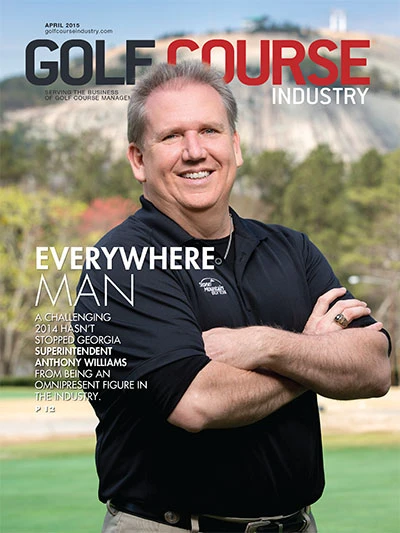 A common tenet among the martial arts is that when the student is ready the teacher will appear. Anthony Williams remembers being “quite ready” by the time Mrs. Tarkenton stepped forward one day at tiny Palmer Stone Elementary School in Oxford, Ga., in the early ’70s. Rain that morning kept Williams and his classmates cooped inside during recess. To keep them amused, Mrs. Tarkenton, the teacher, pasted white paper across one wall telling her pupils to draw who they wanted to be when they grew up.
A common tenet among the martial arts is that when the student is ready the teacher will appear. Anthony Williams remembers being “quite ready” by the time Mrs. Tarkenton stepped forward one day at tiny Palmer Stone Elementary School in Oxford, Ga., in the early ’70s. Rain that morning kept Williams and his classmates cooped inside during recess. To keep them amused, Mrs. Tarkenton, the teacher, pasted white paper across one wall telling her pupils to draw who they wanted to be when they grew up.
When they were done, the mural was dominated by firemen, policemen, doctors and farmers. Williams’ depiction of a karate master stood as a conspicuous stranger. The movie Billy Jack and the TV show Kung Fu may have elevated martial arts in the American consciousness of the time but in rural Georgia most young boys still imagined growing up more like their fathers.
So much so that Williams soon found himself surrounded and defending his outlier ambition against the crowd. Fortunately, Mrs. Tarkenton “stepped into the fray” delivering a message that Williams took to heart and keeps there to this day.
“She told everyone that if you worked hard enough and were willing to make sacrifices, you could be whatever you wanted to be,” Williams recalls. Decades later, Williams would attend a Palmer Stone reunion, not merely as a karate master, but as a grand master. Teaching karate helped pay his way through Abraham Baldwin Agricultural College.
That anecdote may be an overly literal interpretation on the student-teacher precept but it illustrates how early Williams began drawing lessons from life, through the lives of others as well as his own. It didn’t hurt that by then Mrs. Tarkenton had a certain son (Fran) living his own dream playing quarterback for the Minnesota Vikings. “I remember thinking ‘Wow, I really can be anything I want to be,’” Williams says.
Teaching karate helped Williams, who has earned the title of grand master, pay his way through Abraham Baldwin Agricultural College.Anthony WilliamsIn the years that followed, Williams put that lesson to good effect, even adding his own twist to it. If he could in fact “be anything” by working hard enough, why then couldn’t he be many things? Growing up on the family farm in Indian Creek he’d certainly learned how to work.
 So by the time Williams, now 50, was named Georgia Superintendent of the Year last December he hadn’t just added golf course maintenance to his string of expertise. Along the way, he also became a world-ranked archer, a master gardener, a certified arborist, author, speaker, association leader and more. But he very nearly didn’t make it to St. Simons Island to accept this latest honor at the Georgia GCSA’s annual awards banquet.
So by the time Williams, now 50, was named Georgia Superintendent of the Year last December he hadn’t just added golf course maintenance to his string of expertise. Along the way, he also became a world-ranked archer, a master gardener, a certified arborist, author, speaker, association leader and more. But he very nearly didn’t make it to St. Simons Island to accept this latest honor at the Georgia GCSA’s annual awards banquet.
Last October, just 18 days after his wife of 29 years, Phyllis, suffered and survived a massive heart attack, Williams woke at about 4 a.m. with a tightness across his own chest. Even though his older brother died of a heart attack in August, something told Williams he was not having one. Still, he knew something wasn’t right.
“I felt diminished, like I was only operating on about two-thirds,” he says. “But I was breathing pretty well.” Because of that latter fact, he still went to work that day with an “aggressive agenda” as director of grounds at Stone Mountain Golf Club by Marriott in Stone Mountain. It’s no secret now – not when you are as widely known as Williams – that he was late getting home. His return route came to include an ambulance ride, a battery of tests and eventually a helicopter flight for emergency open heart surgery.
Along the way there were some, let’s say, earnest debates with doctors who were certain Williams wasn’t having a heart attack but were unable to locate the source of his by-now considerable discomfort. Then a doctor off-site, examining some of Williams’ test results, saw something the others had missed, an aneurysm on an enlarged valve. He was in imminent danger. “It was a miracle I didn’t die on the treadmill (during testing),” Williams says.
By some measures, it was equally miraculous that he could be at the podium as nearly 200 Georgia GCSA members stood applauding in his honor just two months later. Indeed it was only after son, Luke, agreed to drive his mother and father on the 10-hour round trip that doctors agreed to let Williams travel. And Williams desperately wanted to be there.
At this point, it’s important to note Williams had no idea he was getting any award, let alone the big one. But as chairman of the Georgia GCSA Hall of Fame, he wanted to be there to welcome a trio of new inductees. Launched in 2011, the Hall of Fame is something of Williams’ own baby. He is passionate about maintaining the links between generations of the superintendent profession and honoring their legacies.
“People like Palmer Maples, Jr. and Ken Mangum and so on, they left a very clear message of what it means to be a professional golf course superintendent,” he says. “I hope to leave a similar trail of bread crumbs for those coming along to be able to follow. You owe the people who came before you and you those coming after you too.”
That’s a mindset that predates Williams’ arrival in golf, and Mrs. Tarkenton, too, for that matter. It was in his raising and maybe in his blood. Learning to work alongside his father and his grandfather as soon as he could walk, Williams says he was “blessed with a great childhood.” “My father would get up 3:30 every morning to go and work a 10- or 12-hour shift at General Motors then come home and do whatever was needed on the farm,” he says. “We were constantly working.”
Through that toil and the talk that went on around it, Williams absorbed many lessons from his father and grandfather. “If you take care of the land it takes care of you.” “Character is important.” “What you do and why you do it makes a difference.” “Perseverance really matters.”
Williams also attributes his part-Cherokee heritage to his love of the natural world. His great-great-great-great grandmother was Cherokee. In 2010, the Atlanta Journal-Constitution wrote that Williams’ connection to the earth was “a legacy of her wisdom of natural rhythms for planting and conservation. His drawl makes “soils” into “souls,” and for him both are connected. “Passion for the land always came easily to me,” he says. “It feels like it comes from something pretty deep.”
It also goes pretty far.
 Over a 30-plus year career Williams hasn’t so much achieved milestones as he has amassed them. In 2014, he received GCSAA’s Excellence in Government Relations Award. This time last year he received GCSAA’s Excellence in Government Relations Award. In 2010, he received GCSAA’s President’s Award for Environmental Stewardship and was the overall winner of the GCSAA and Golf Digest Environmental Leaders in Golf Awards in 2006. He was twice a winner in the chapter category. In 2012, he published a book “The Environmental Stewardship Toolkit,” a collection of best practices and ideas for the environmental management of golf courses. He has served on the Georgia GCSA board of directors since 2001 and was president in 2010-11.
Over a 30-plus year career Williams hasn’t so much achieved milestones as he has amassed them. In 2014, he received GCSAA’s Excellence in Government Relations Award. This time last year he received GCSAA’s Excellence in Government Relations Award. In 2010, he received GCSAA’s President’s Award for Environmental Stewardship and was the overall winner of the GCSAA and Golf Digest Environmental Leaders in Golf Awards in 2006. He was twice a winner in the chapter category. In 2012, he published a book “The Environmental Stewardship Toolkit,” a collection of best practices and ideas for the environmental management of golf courses. He has served on the Georgia GCSA board of directors since 2001 and was president in 2010-11.
And that is merely a snapshot of a resume that continues to grow. Just last year, Williams signed on as one of the GCSAA’s grassroots ambassadors to establish and enhance relationships with legislators. He can’t help himself helping others. “If it’s carrying the boxes when the show is over or if it’s cleaning the bathrooms, I want to be that guy,” he says.
“Anthony Williams personifies the maximum of every criterion we weigh when we consider the Superintendent of the Year Award,” Georgia GCSA president, Mike Brown, from The Standard Club in Johns Creek, says. “The work he has done for his facility, for his association, for this profession, and for golf as a whole, establishes a new standard that stands as inspiration and motivation for the rest of us.”
That’s how Williams himself feels about the men he helped induct into the Hall of Fame earlier at the awards banquet and why he was so desperate to be there. There was no pun or exaggeration when he said it “would have broken my heart not to be there.” It’s also how he feels about the man who helped present the Superintendent of the Year. Frank Siple, CGCS of Corbin Turf and Ornamental Supply, was one of the first people in the profession to reach out to the young Williams.
“This association has been my career,” Williams says. “To be standing there that night when two months earlier I didn’t know if I would live to see the next day is about as far on two ends of a spectrum as I think you can be. It’s been a very trying year in many ways but it has been very rewarding too … which is kind of what life is I guess.”
Trent Bouts is a Greer, S.C.-based writer, editor and frequent GCI contributor.
Get curated news on YOUR industry.
Enter your email to receive our newsletters.
Explore the April 2015 Issue
Check out more from this issue and find your next story to read.
Latest from Golf Course Industry
- GCSAA’s Health in Action 5K/2K reaches fundraising goal
- Landscapes Golf Management to participate in data analyzation initiative
- Reel Turf Techs: Carl Michael
- Atlanta Athletic Club approves funding for master plan
- Maximizing Cultural Practices and Agronomic Benefits with Minimal Surface Disruption
- Real Answers about Spray Nozzle Choices
- From the Course to the Factory: How Customer Insights Drive Innovation
- New & Proven Enzyme Strategies for Sprayable Thatch Management






